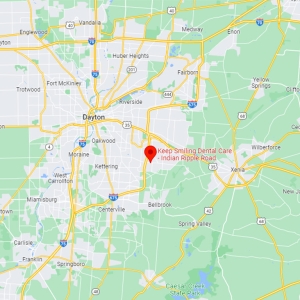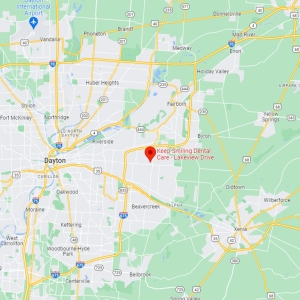Oral Surgery

Keep Smiling Dental specializes in providing exceptional dental services to people of all ages. We only use state-of-the-art equipment and the most modern technology available. You can find us at either of our two locations in Beavercreek, OH. We look forward to helping you maintain a beautiful smile!
What Is Oral Surgery?
Oral surgery is a blanket term for any surgical dental procedure performed in or around your mouth, teeth, gums, jaw, or other oral or facial structures. Oral surgery in Beavercreek, OH, is an invasive dental procedure that requires the surgery to be performed below the soft tissue of your mouth and gums.
Who Performs Oral Surgery?
Oral surgery can be performed by a dentist or an oral surgeon, depending on the complexity of the surgery.
When Is Oral Surgery Needed?
Your dentist in Beavercreek, OH, might recommend oral surgery if you have any of the following.
- Missing or loose teeth.
- Abscessed teeth.
- Oral cancer.
- Impacted wisdom teeth.
- Sleep apnea.
- Noncancerous lumps
- Jawbone loss.
- Severe tooth decay.
- TMJ (temporomandibular joint disorder).
The dentist will perform a comprehensive oral exam and then recommend a treatment that best suits your needs.
The Most Common Oral Surgery Procedures
Most dentists will use one or more of the following surgical procedures to correct your dental issues.
Simple Tooth Extractions
If you have a tooth or several teeth that can’t be saved with a filling, crown, inlay, onlay, or other dental treatment, you will need to have your tooth/teeth surgically extracted.
In most cases, simple tooth extractions are done using local anesthesia. If you need a more extensive dental procedure, your dentist might use general anesthesia or other form of sedation.
After your tooth has been extracted, your dentist will complete the restoration with a dental implant, denture, or other permanent dental appliance.
Wisdom Tooth Extractions
If you have wisdom teeth that don’t have room to erupt, they become impacted under or partially under your gums. Impacted wisdom teeth, in most (but not all) cases, will become infected or damage the surrounding teeth, causing other dental issues.
Your dentist can perform a wisdom tooth extraction. The procedure is fairly simple. An incision is made in your gum so your dentist can remove the impacted tooth in sections. Your new dental appliance can then be placed.
Some dentists believe it’s better to remove all wisdom teeth even if they aren’t causing problems or have the potential to cause problems in the future. However, that belief varies from dentist to dentist. Your dentist will talk with you about your wisdom teeth, and together, you can decide which route is best for you.
Bone Grafting
Bone grafting surgery is performed when your jawbone has lost its density. Not having enough jawbone could prevent you from getting dental implants. Jawbone loss can also cause a myriad of other functional oral issues, as well as affecting your overall appearance. Your dentist might recommend bone grafting surgery in order to provide you with dental implants or to correct a functional or cosmetic issue.
During bone grafting surgery, your dentist will make an incision just below your gums. Then, they will take bone from another part of your body or use a special grafting material and place it under your gums, cover it, and stitch it up. It will then take a few weeks and sometimes months for the graft to evolve into bone that is healthy enough to hold a dental implant or ready to undergo another oral treatment.
If you have a missing tooth/teeth, your jawbone will begin to deteriorate. Without having a root in place, your jawbone will shrink and then be reabsorbed into your body. This affects the shape of your jaw, giving you a sunken-face look. It could also affect the stability of the surrounding teeth.
Therefore, if you want to avoid needing a bone graft, it’s best to address the space left by a missing tooth/teeth immediately before reabsorption occurs.
Sinus Lifts
Sinus lifts, sometimes called sinus augmentation, are dental procedures that increase the amount of bone in your upper jaw after bone loss. Bone loss can be caused by periodontal disease or tooth loss.
When this happens, you aren’t left with enough bone available for a dental implant. A sinus lift will raise the sinus floor by adding bone to your upper jaw to make it taller. So, basically, bone or grafting material will be used to widen your jawbone so there is enough room to place your new dental implants.
Implant Placement Surgery
Replacing missing teeth with dental implants is the best way to preserve your smile and maintain the proper function of your teeth and bite.
Implant placement surgery involves removing the root of your tooth, inserting a titanium post (screw) into that space, and allowing bone to form around it, which can take about four to six months. The bone fusion is what makes your implants just as strong and functional as your natural teeth.
Once the bone has fused to your implant, an abutment (the piece that connects the implant to your artificial tooth) will be added to the top of your implant, and an artificial tooth (crown) will be permanently affixed to that.
If you are not a good candidate for this type of dental implant, your dentist will go over your other dental implant options or dental implant alternatives with you.
The Benefits of Having Oral Surgery
There are plenty of benefits that come from having oral surgery.
- Immediate pain relief.
- Improved oral function.
- Better overall health.
- Improved appearance.
- Prevention of future dental issues.
What to Do Immediately After Having Oral Surgery
After you’ve had oral surgery (of any kind), it’s best to follow some basic practices.
- Avoid vigorously swishing water around in your mouth and spitting. Doing so could interrupt the healing process.
- Don’t exercise for at least 48 hours.
- Elevate your head for the first few days to minimize swelling.
- Take all medications your dentist recommends as prescribed.
- Apply an ice pack to the outside of your jaw to help reduce swelling.
- Apply a warm cloth to the outside of your jaw to help stimulate the blood flow to the area.
How to Know If You Should Contact Your Dentist
Immediately after your surgery is when you have the greatest chance of developing an infection. So, if you have severe pain that won’t go away with your medication, a fever of 102°F or higher, or if you have puss in or around the incision, contact your dentist immediately!
Contact Keep Smiling Dental – A Reputable Dentist in Beavercreek, OH
Don’t trust your oral surgery procedures to just anyone. Please Contact Keep Smiling Dental today. We have a highly trained, experienced, kind, and compassionate staff that promises to treat you the way they themselves would want to be treated. Whatever you need, we will be right there with you every step of the way!




